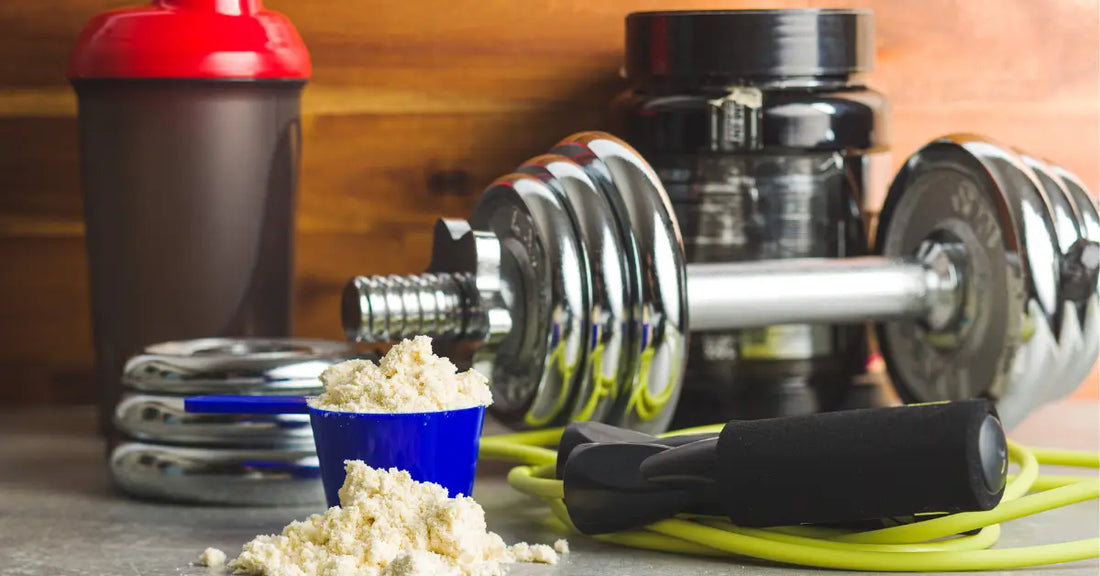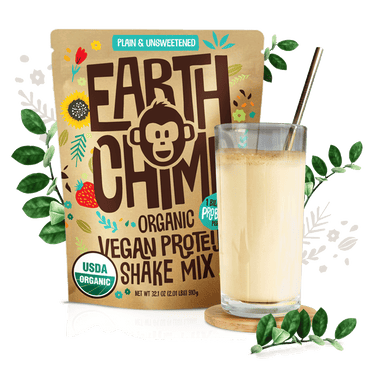Are protein powder and pre-workout the same? Many people who work out often wonder about this. Even though both are common in the fitness world, they actually do very different things. Protein powders help your muscles recover and grow after exercising. Pre-workout formulas boost your energy and focus when you exercise.
We'll look closely at what each supplement does in this article. You'll see how they fit into your workout plan. Whether you're just starting at the gym or you've been going for years, knowing these differences can really help your fitness results. Let's find out what makes each supplement special and how they can work together to help you reach your fitness goals.
Comparing Pre-Workout vs Protein Powder
Protein Powder: Helps Build and Repair Muscles
Protein powder and pre-workout supplements each have their own role in a fitness fan's routine. Protein powder is a rich source of protein that helps with muscle growth, recovery, and reducing muscle loss when you're on a diet. It gives your body a form of protein that's easy to digest.
Protein powders are really helpful for people who find it tough to get enough protein from food alone. They offer a handy way to make sure your body gets what it needs to build and maintain muscle. Also, using protein powder can help keep muscle loss at bay when you're cutting down on calories to lose body fat.
Pre-Workout Supplements: Boosts Energy and Concentration
On the other hand, pre-workout supplements aim to boost your physical performance and help you do more in your workouts by giving you extra energy and focus. These supplements often have ingredients like caffeine, which keeps you alert and makes the effort feel easier.
Other key ingredients in pre-workout formulas, such as beta-alanine and creatine, help prevent muscle tiredness and enhance strength. This lets you train harder and more effectively. With the support for better endurance and focus, pre-workout supplements can help seasoned gym-goers challenge themselves and see better results.
What's Inside: Key Ingredients of Fitness Supplements

Protein Powder: What's in It?
Protein powders come from different sources like milk (whey and casein), eggs, soy, peas, and other plants. Each type has its own mix of amino acids and might have extra nutrients too. For instance, whey and casein are good for getting calcium, and pea protein is a great source of iron.
Most protein powders give you 20-25 grams of protein in each serving. Vegan proteins might have a bit less, usually 15-20 grams per serving. Besides protein, these powders can have a little fat and carbs. Vegan types tend to have more carbs than those made from animal derived products.
Pre-Workout Supplements: Boost Your Workout
Pre-workout supplements pack ingredients that help you do better in your workouts. Caffeine is a common one. It keeps you sharp, focused, and ready to go. Here are some other important ingredients:
- Beta-alanine: This amino acid fights off muscle tiredness, letting you work out longer and harder.
- Creatine: It helps your muscles make more energy, so you can push harder and grow stronger.
- L-Citrulline: This amino helps improve blood flow. This means better nutrient delivery and awesome muscle pumps.
- Betaine: It helps keep your cells hydrated and can boost muscle power and endurance.
Most pre-workouts are low in calories and don't really have fats or carbs. Some might also include amino acids like BCAAs or tyrosine to help with muscle recovery and focus.
When to Take Fitness Supplements
Protein Powder: Good for Almost Everyone
Protein powder is super flexible and helps a lot of different people, no matter their fitness level or goals. You'd usually have it after working out to help your muscles recover and grow.
It's also handy if you're trying to lose weight because it helps keep your muscle mass even when you're eating less. Getting more protein when you're losing weight, especially if you're also doing strength training, may help you avoid losing muscle that often happens during calorie-restricted diets
Plus, protein powder makes getting enough protein easy, without lots of cooking. That's great for busy folks who can't always prepare protein-rich meals. By adding protein powder to their diet, they make sure they're getting the protein their muscles need to recover and grow.
Pre-Workout Supplements: Best for the Pros
Pre-workout supplements are perfect for folks who've been working out for a while and have strong muscles and fitness. They can handle the kick these supplements give and really benefit from the extra energy, focus, and stamina.
You'd want to take these supplements about 20 minutes before your workout. This gives your body time to take in all the good stuff and get ready for action. But remember, everyone reacts to caffeine differently, so it's a good idea to talk to a doctor before you start using pre-workout supplements in your routine.
Mixing Protein Powder with Pre-Workout Supplements

While protein powder and pre-workout supplements have different roles, you might think about using them together for better fitness results. Combining them can give you the perks of both—more energy and focus when you train, and support for your muscles to recover and grow.
But, it's important to be careful with the ingredients in both supplements to avoid mixing too much of the same stuff. For instance, many pre-workouts already have amino acids, so adding more from protein powder might be too much.
If you're thinking about mixing these supplements, make sure to stick to the recommended amounts for each one. Pick products that work well together and don't mess each other up.
Talking to a fitness pro or a doctor can also help you make smart choices about combining these supplements.
Picking the Best Supplement for Your Fitness Goals
Protein Powder for Muscle Building and Recovery
If you're really into building muscle and recovering well, protein powder is a great pick. It gives you a lot of protein, which you need to grow and fix muscles. When choosing a protein powder, think about what it's made from, the amino acids it has, and any extra nutrients.
Whey protein isolate is top-notch for muscle growth because it has all the amino acids you need, lots of leucine, and your body absorbs it fast.
Plant-based proteins, like pea or soy, are also good for muscle growth if they have enough protein and all the necessary amino acids. These are especially good if you're vegan, vegetarian, or intolerant to dairy products..
Pre-Workout for Better Energy and Focus
For those who have been training for a while and want an extra kick of energy, focus, and better performance, pre-workout supplements can make a big difference. These supplements have stuff like stimulants and other ingredients that help you work harder and get better results.
When picking a pre-workout, you should think about how well you handle caffeine and other stimulants. It's also important to think about how it might mix with any health issues or medicines you have. It's best to start with a small amount and see how it goes, but keep within the safe limits.
Also, go for a pre-workout from a trusted brand that uses well-researched, quality ingredients. And, it's a good idea to talk to a doctor before you start using pre-workout supplements.
Things to Think About When Picking a Protein Powder or Pre-Workout Supplement

Knowing the Ingredients and Labels
When you're picking a protein powder or pre-workout supplement, it's really important to check the ingredient list and nutrition info on the label. Look for products that clearly show all their ingredients and amounts. This helps you make a better choice.
Watch out for artificial additives, fillers, or proprietary blends. These can hide the actual ingredients and their doses. Go for supplements with high-quality, well-researched ingredients in good amounts. These are more likely to work well.
Also, think about your own dietary needs or allergies. For instance, if you're lactose intolerant, you might want a plant-based protein powder instead of a whey one. If you're sensitive to caffeine, a stimulant-free pre-workout might be better for you.
Talking to a Healthcare Provider
Before you start using any new supplement, it's a good idea to talk to a healthcare provider. This is especially important if you have health conditions or take medications. A professional can help you figure out if a supplement is safe and right for you.
Some ingredients in protein powders or pre-workout supplements might not mix well with medications or could make health problems worse. For example, if you have kidney issues, you might need to watch your protein intake and get advice from a dietitian to make sure you're eating the right amount.
By getting advice from a healthcare provider, you can make better decisions about supplements and avoid any bad side effects. This can also help you find out if you have any nutrient gaps and see where supplements might help, giving you a more personalized approach to fitness and nutrition.
Choosing What's Best for Your Workouts

Now you know how different protein powder and pre-workout supplements are. Protein powder helps your muscles grow and repair after you work out. Pre-workout gives you a boost before you start exercising.
If you're looking for a healthy protein option, check out our EarthChimp Vegan Protein. It's all organic and comes from plants like pea, pumpkin, sunflower, and coconut. It's free from dairy, gluten, GMOs, and artificial stuff. Plus, it's got probiotics to help your stomach. It's a great choice if you care about what goes into your body.
Picking the right supplements can help you get the most out of your gym time. So take it easy, look into your options, and find what fits your needs and your workout plan.
References:
- https://www.webmd.com/fitness-exercise/health-benefits-pre-workout-supplements
- https://www.ncbi.nlm.nih.gov/pmc/articles/PMC5421125/
- https://www.ncbi.nlm.nih.gov/pmc/articles/PMC6413194/
- https://www.webmd.com/fitness-exercise/health-benefits-pre-workout-supplements
- https://torokhtiy.com/blogs/guides/pre-workout-vs-protein-powder
Disclaimer:
This statement has not been evaluated by the Food and Drug Administration. This product is not intended to diagnose, treat, cure, or prevent any disease.















